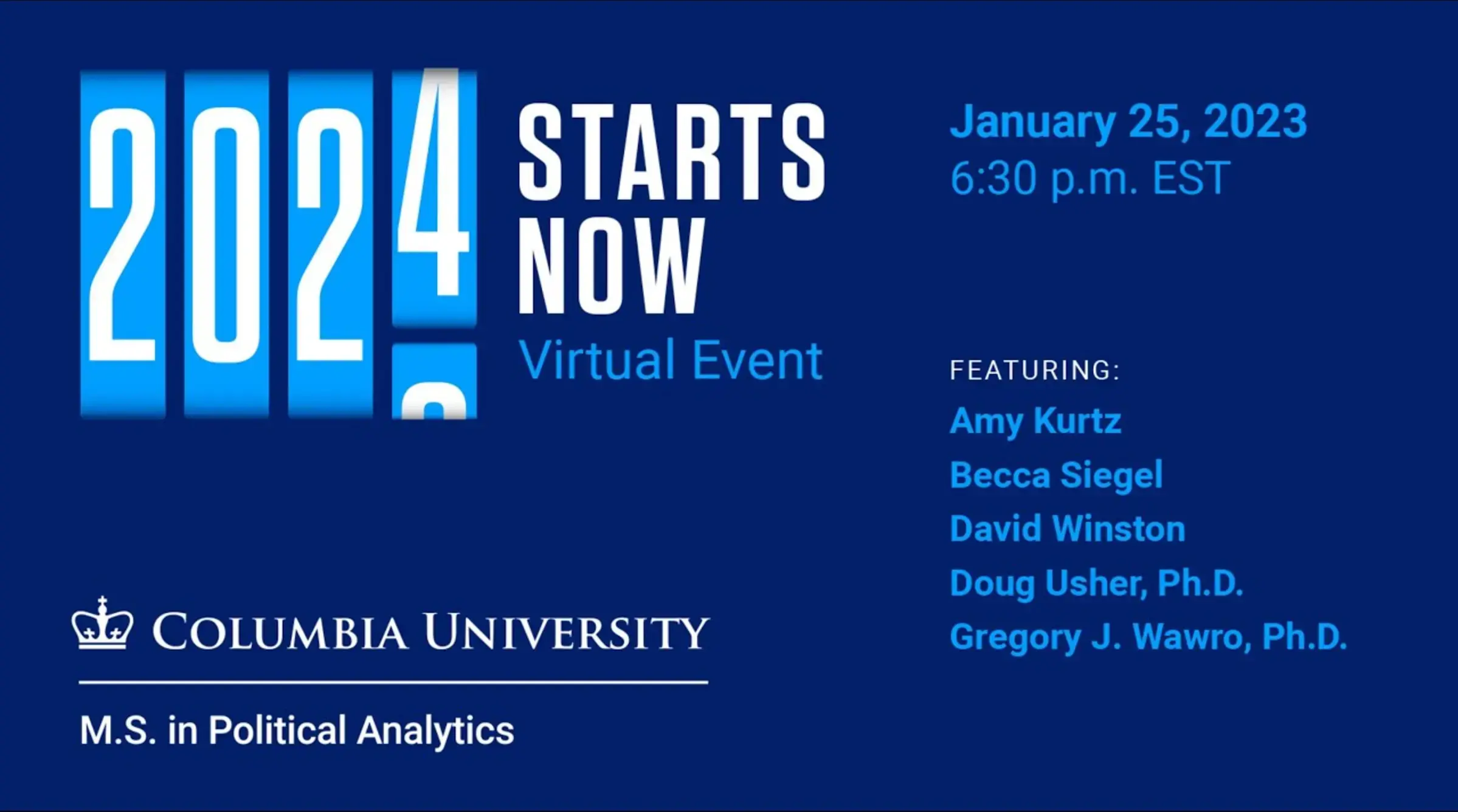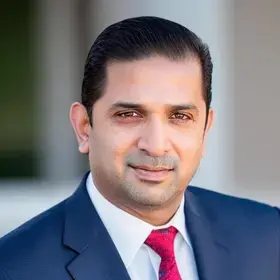In a recent discussion sponsored by the Columbia University M.S. in Political Analytics program, a panel of industry experts and academics discussed the increasing demand for political analytics—and what’s in store for ’24.
What motivates voters, and how do political campaigns and advocacy groups gain the intelligence they need to move the needle in their favor? In a far-reaching conversation sponsored by the Columbia University M.S. in Political Analytics program, industry insiders and academics shared their thoughts on the forces at play in the U.S. political campaign arena for the upcoming election in 2024.
They also discussed how the expansive integration of data analytics in political campaigns has led to an increased demand for experts who are uniquely equipped in the substance of politics and quantitative methods to drive decision-making but can also communicate effectively about data and politics with other professionals and laypeople. The Political Analytics program is designed to fill an important role in the rapidly developing field of data analytics as it is applied to politics and policy advocacy. Furthermore, it will provide a clear professional trajectory, by helping students acquire necessary skills to advance their careers and open up new opportunities in different industries.
The panel, hosted by Columbia University Political Science Professor Gregory J. Wawro, who is also the Political Analytics program founder and director, included members representing Democratic, Republican, and progressive interests. Even though the panelists come from different political camps, all agreed on the growing importance of data in politics, and the omnipresent need for highly skilled political analysts.
Professor Wawro specializes in American politics, including Congress, elections, and campaign finance. Doug Usher, Ph.D., partner at Forbes Tate Partners, served as moderator. Usher has deep expertise and experience in opinion research, data analysis, and analytics. Amy Kurtz is the president of the Sixteen Thirty Fund, where she supports the work of donors and progressives across the country through fiscal sponsorship. David Winston, president of the Winston Group, has served as a strategic adviser to Senate and House Republican leadership for the past 15 years. He was formerly the director of planning for Speaker of the House Newt Gingrich. Becca Siegel was the chief analytics officer on the Biden campaign in 2019 and 2020, and today she works with campaigns, organizations, and companies in and out of politics to guide decision-making, analytics, outreach, and political strategy.
Panelists agreed that understanding and courting voters has moved far beyond rudimentary polling methods and old-fashioned stumping into a vastly more sophisticated territory of predictive modeling and data analytics to understand the forces that can persuade voters and affect the probability of a win or loss at the most granular levels. Said Kurtz, “We can’t go talk to base voters after Labor Day and say, ‘Hey, don’t forget there’s an election soon.’ The conversations have to go on all the time.”
In this data-rich landscape, as analysts look to the future, Siegel explained, the lessons of the past are well remembered. “What we really focused on in 2020 was how to create a strategy that was resilient to a great degree of uncertainty. How do we build strategies and voter-outreach methods that are as resilient as possible to the whole litany of things that might go wrong? That will be the sales pitch that who[ever] the chief analytics officer is will have to make. Anyone who is responsible for campaign strategy today—and moving forward—has to have a very strong fundamental understanding of analytics.”
The panel also discussed how redistricting factors into races. Said Siegel, “One of the biggest consequences of this last round of redistricting was that there are many fewer competitive districts than there were before.” Winston added, “Typically when majorities fall apart, it’s when that base swing element within a conference basically stops agreeing and trying to work with each other because they develop fights. That’s been exacerbated by the fact that there are just less and less competitive seats.” The impact of fewer competitive seats can also have a significant impact on the ability to govern. Said Professor Wawro, “The real question is whether we get back to a place where some bipartisanship is possible. If you look at the history of when Congress actually functions and gets things done, it's when you have broad bipartisan support for legislation. We still get it occasionally, [but] it’s become less common.”
The panel also provided insights from previous elections to offer some expectations for the 2024 race. “One of the challenges for people to watch in terms of the Republican side is as this primary evolves, is it about personality or is it about policy?” said Winston. “And that’s going to be an important component because for the base of both parties, personality plays an interesting role in terms of engagement with other conservatives or liberals, depending on the side.” Big personalities can figure “bigly.” To wit, Donald Trump. Said Professor Wawro, “The biggest question here is what is Donald Trump’s status in the Republican Party, and how do expectations about him being the nominee evolve? So if Donald Trump continues to be the dominant force in the Republican Party, he will command loyalty to his agenda. And that’s going to make it harder to go against the MAGA crowd.”
The question of personality versus policy was also recently in play in the 2022 Senate race in Georgia. Said Kurtz, “I listened to somebody wax poetic about all the work that was done on the ground in Georgia in that short runoff period. Now that’s not to say that it wasn’t close, and maybe it shouldn’t have been close against Herschel Walker, but there was an incredible amount of high-quality voter contact that happened on the progressive side that was super meaningful to get us a progressive Jewish Democrat and a progressive preacher as two senators from Georgia.” She added, “We are counting impressions, meaningful conversations, [and] attempts at those conversations. We are doing all the analytics on all of these things.”
Although the panelists represent different partisan interests, they all agreed about the ever-increasing importance of data and analytics to inform political strategy. This has produced unprecedented demand for trained political analysts. “What we know,” said Professor Wawro, “is that the demand for data analysts who can inform campaign decision-making in any capacity across disciplines is increasing. We have structured the M.S. in Political Analytics program to satisfy that need.” Said Usher, “Folks behind the scenes and now more and more at the front of the scenes are using those quantitative skills for politics, not just on Election Day, but literally 24/7, 365.”
Join an upcoming information session or visit our website to learn more about the Columbia University M.S. in Political Analytics program. Application priority deadline: February 15, 2023. The final application deadline is June 15, 2023. The 36-credit program is available part-time and full-time.
For general information and admissions questions, please call 212-854-9666 or email politicalanalytics [[at]] sps [[dot]] columbia [[dot]] edu



